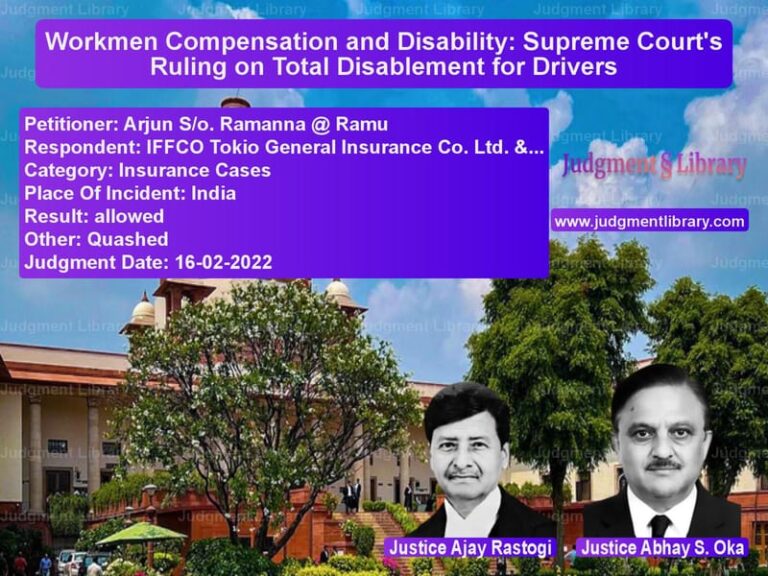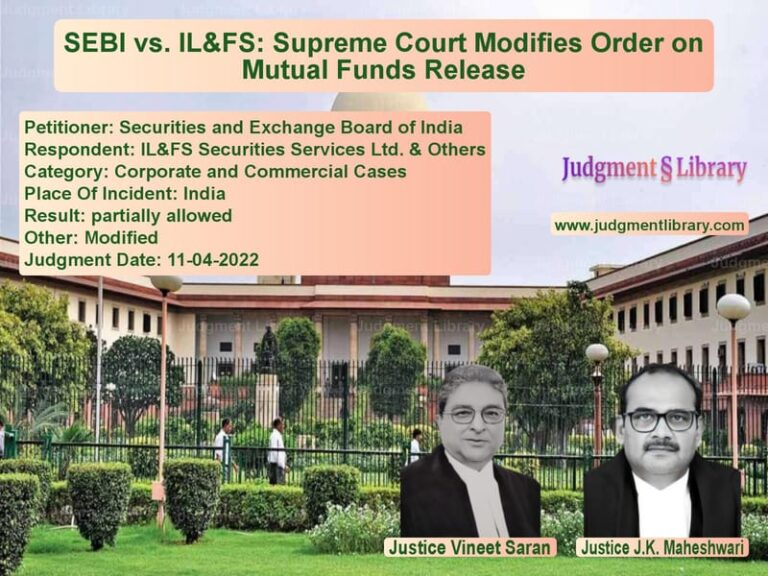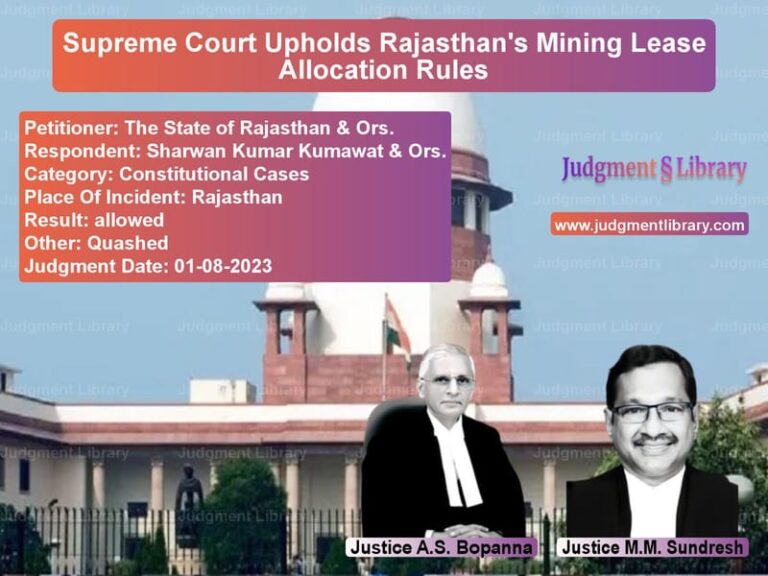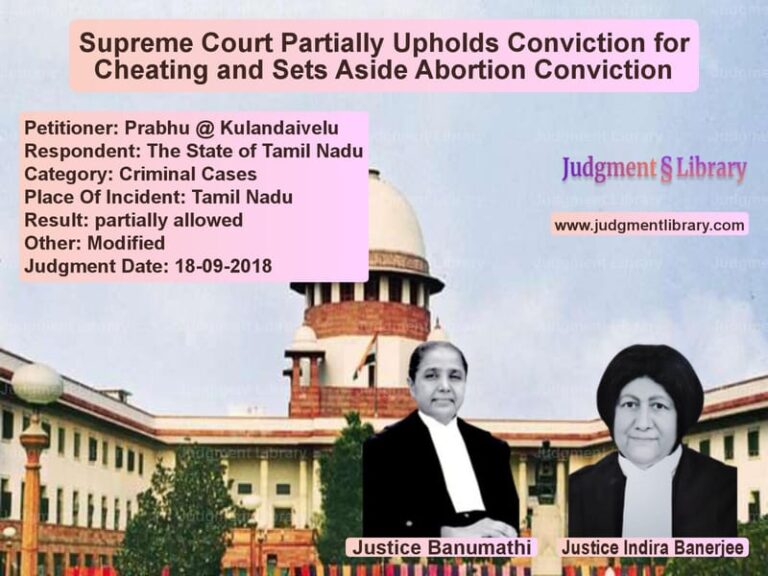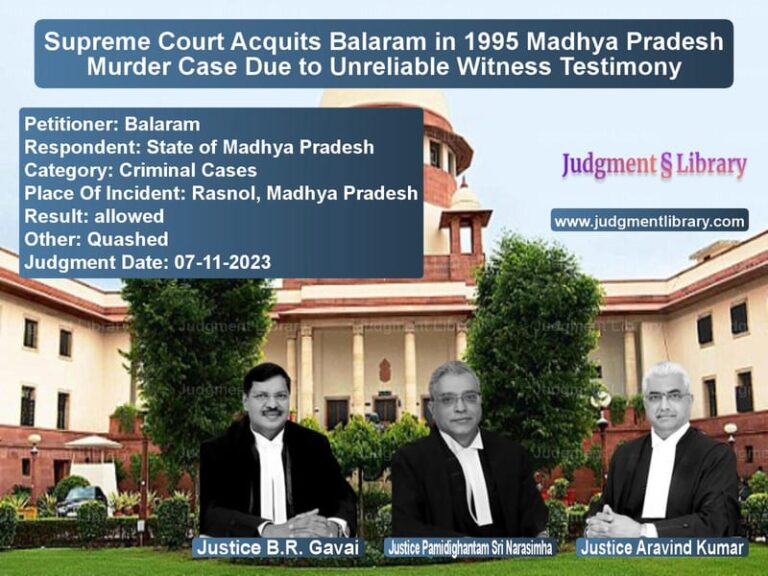Supreme Court Rules on Property Sale as Mortgage in Ramvilas vs. Karim Khan
The distinction between a sale deed and a mortgage by conditional sale is often a contentious legal issue. The Supreme Court addressed this in Ramvilas (Dead) Through LRs & Anr. vs. Karim Khan & Anr., ruling on December 1, 2016. The case examined whether a sale deed executed in favor of the appellants was an absolute sale or merely a security for a loan taken by the respondent.
Background of the Case
The dispute arose over a property transaction that took place on June 14, 1972. The 1st respondent, Karim Khan, executed a sale deed in favor of the appellants, transferring ownership of the land. However, an agreement was also signed on the same day, stating that if the 1st respondent repaid ₹5,000 by June 14, 1973, the sale deed would be canceled and the land returned. The respondent subsequently paid ₹6,700 under a second agreement dated June 5, 1974. However, the dispute arose when, nearly 17 years later, the respondent filed a suit seeking a declaration that the sale deed was, in fact, a mortgage.
The trial court and the High Court of Madhya Pradesh ruled in favor of the respondent, declaring the sale deed to be a mortgage. The appellants then appealed to the Supreme Court.
Petitioners’ (Ramvilas & Anr.) Arguments
- The appellants argued that the sale deed was an absolute conveyance of property and not a mortgage.
- The separate agreement allowing for the return of the property on repayment of the loan should be treated as a re-conveyance, not a mortgage.
- The respondent failed to comply with the condition to repay ₹5,000 by June 14, 1973.
- The respondent delayed filing the suit by nearly 17 years, and such a delayed claim should not be entertained.
- The respondent should have sought cancellation of the sale deed, which was not done.
- They cited previous Supreme Court rulings, including Bishwanath Prasad Singh vs. Rajendra Prasad (2006) and Raj Kishore vs. Prem Singh (2011), to support their contention.
Respondents’ (Karim Khan & Anr.) Arguments
- The sale deed was merely a security for a loan, not an absolute sale.
- The condition allowing the respondent to reclaim the property upon repayment of ₹5,000 was evidence that the transaction was a mortgage.
- The land’s actual value at the time was much higher than the ₹3,000 mentioned in the sale deed, indicating that it was not a genuine sale.
- The courts had correctly interpreted the intention of the parties and ruled in favor of the respondent.
Supreme Court’s Judgment
The Supreme Court, comprising Justice R.K. Agrawal and Justice R. Banumathi, upheld the concurrent findings of the lower courts and dismissed the appeal. The key findings were:
- The intention of the parties is the most crucial factor in determining whether a transaction is a sale or a mortgage.
- Since the sale deed and the agreement allowing for repayment were executed on the same day, they must be read together.
- The trial court’s finding that the land’s actual value was over ₹15,000, but was sold for only ₹3,000, strongly suggested that it was not a genuine sale.
- The respondent had repaid ₹6,700 under a second agreement, further reinforcing that it was a mortgage arrangement.
- In the case of Bhaskar Waman Joshi vs. Shrinarayan Rambilas Agarwal (1960), the Supreme Court had held that a transaction’s nature must be determined based on its true intent rather than just the language used in the documents.
- Since the respondent had already repaid the loan amount, he was entitled to reclaim the property.
The Supreme Court dismissed the appeal and ruled that the sale deed was in fact a mortgage by conditional sale, thus restoring ownership to the respondent.
Key Legal Takeaways
- Determining Sale vs. Mortgage: The true nature of a transaction must be assessed based on the parties’ intent and surrounding circumstances.
- Execution of Simultaneous Agreements: If a sale deed is accompanied by an agreement allowing the seller to reclaim the property, it may be considered a mortgage.
- Market Value Considerations: If the sale price is significantly lower than the market value, courts may view the transaction as a security for a loan.
- Timely Legal Action: Delayed claims can weaken a case, but they do not automatically disqualify a valid mortgage claim.
Conclusion
The Supreme Court’s judgment in Ramvilas vs. Karim Khan underscores the importance of examining the intent behind property transactions. While written agreements play a significant role, the courts will also consider extrinsic factors such as the property’s market value, the timing of agreements, and the behavior of the parties involved. This ruling reinforces the principle that an ostensible sale may be reinterpreted as a mortgage if there is sufficient evidence to show that the true purpose was to secure a loan.
Don’t miss out on the full details! Download the complete judgment in PDF format below and gain valuable insights instantly!
Download Judgment: Ramvilas (Dead) Thro vs Karim Khan & Anr. Supreme Court of India Judgment Dated 01-12-2016.pdf
Direct Downlaod Judgment: Direct downlaod this Judgment
See all petitions in Property Disputes
See all petitions in Judgment by R K Agrawal
See all petitions in Judgment by R. Banumathi
See all petitions in dismissed
See all petitions in supreme court of India judgments December 2016
See all petitions in 2016 judgments
See all posts in Civil Cases Category
See all allowed petitions in Civil Cases Category
See all Dismissed petitions in Civil Cases Category
See all partially allowed petitions in Civil Cases Category


